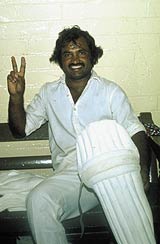Mushtaq Mohammad - Inside Out
Andrew Miller reviews Mushtaq Mohammad - Inside Out
Andrew Miller
21-Aug-2006
|
|

|
One of Pakistan's famous five, Mushtaq Mohammad may not have
been as prodigiously gifted as his elder brother Hanif, but he went
on to score more first-class centuries and take more wickets with his
wrist-spin than any of his elder siblings. In an international career
that spanned three decades, he emerged from the classroom to become
the youngest Test centurion in history, and 40 years later, he was
still at the sharp end of Pakistan cricket, as coach of the side that
reached the final of the 1999 World Cup.
Mushtaq's is a story that has been waiting to be told, not least
because his career virtually spans the entire history of Pakistan
cricket, starting as it did with his family's trek from Western India
to Karachi at Partition in 1947, whereupon he spent his formative
years living and learning his cricket in a former Hindu temple. In 281
pages of honest and evocative narration, Mushtaq takes us at a jaunty
pace through the highs and lows of a life in cricket.
"There may be portions that will ruffle some feathers," Mushtaq
promises in the preface, and in that regard he doesn't disappoint, as
he hits back at Allan Border's claims that he asked him to fix an
Ashes Test in 1993, before laying into his own underperforming World
Cup team for their suspicious defeat against Bangladesh in May 1999.
"They were just such talented players," he wrote, "and I couldn't
comprehend that these boys could get out in the way they did."
The controversy, however, is just part and parcel of Pakistan cricket.
The real appeal of the book is the enthusiasm of the narration. Aided
by an excellent working relationship with his ghost, Richard Sydenham
- whose use of short snappy paragraphs gives every sentence the feel
of an anecdote - Mushtaq has no need for the hackneyed clichés that
litter the autobiographies of your average English pro.
There are gems to be found in every chapter - the confusion he felt as
a Test cricketer on the one hand and the classroom dunce on the other;
the day he was heckled to pieces by a Jamaican known only as "Big Bad
John", and some first-rate bluster and bullshit as delivered by Fred
Trueman at Trent Bridge in 1962.
There is an appealing absence of self-justification in the manner that
Mushtaq compiles his memoirs, even when describing the chain of events
that led to the abrupt end of his career ahead of the 1979 World Cup -
a typical tale of backstabbing and duplicity that others, particularly
former captains, have related with greater gusto and bitterness.
Mushtaq comes across as a man content with the mark he made on the
game, and as a result his recollections are a pleasure to share.
Andrew Miller is UK editor of Cricinfo